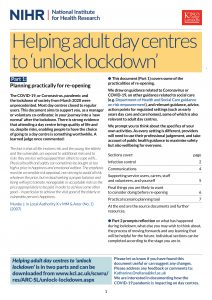 Caroline Green and Katharine Orellana, Post-Doctoral Fellows, National Institute for Health Research Applied Research Collaboration South London. (721 words)
Caroline Green and Katharine Orellana, Post-Doctoral Fellows, National Institute for Health Research Applied Research Collaboration South London. (721 words)
On 23 March 2020, most of England’s population was placed into ‘lockdown’ due to the novel Coronavirus or COVID-19 pandemic taking hold across the UK. This was an unprecedented move by the government and meant that social care services, including day centres for older people or those with social care needs mostly closed to regular users.
Several months later, the government is taking a step-by-step approach to ‘unlocking’ society, with social clubs and community centres allowed to open again from 4 July 2020. But, with the pandemic not yet subsided, day centres are faced with the task of making their services safe and reducing the risks of infections to service users and staff. This is particularly important for day centres, as they may serve groups of people at risk of being seriously affected by the virus, such as people with underlying health conditions.
To date, day centres have not been issued with any guidance on how to go about unlocking their services safely and inviting users back. NIHR ARC South London has produced guidance that aims to support managers or volunteer co-ordinators of day centres to plan for a ‘new normal’. We are also working with the Social Care Institute for Excellence (SCIE) to help take this further.
The resource is free of charge, can be easily downloaded and printed off. We would really appreciate feedback on the document’s usefulness. Please follow this link to find the resource:
Helping adult day centres to ‘unlock lockdown’
The guidance has two parts:
Part 1 covers some of the practicalities of re-opening. We draw on guidance related to Coronavirus or COVID-19, on other guidance related to social care (e.g. Department of Health and Social Care guidance on risk empowerment), and relevant guidance, advice, action points for regulated settings (such as early years day care and care homes), some of which is also relevant to adult day centres. The reader is prompted to think about the specifics of their own activities. As every setting is different, providers will need to use their professional judgement, and take account of public health guidance to maximise safety but also wellbeing for everyone.
Sections cover: infection control, communications, supporting service users, carers, staff and volunteers, and yourself, some final things people are likely to want to consider doing before re-opening, and there is a practical scenario planning tool. At the end are source documents and further resources.
Part 2 is a Word document that aims to prompt reflection on what has happened during lockdown, what else you may wish to think about, the process of moving forwards and any learning that will be helpful for the future. Individual sections can be completed according to the stage you are in. It reflects the strong evidence that day centres are valued by the people who attend and that they improve their quality of life. They help people to stay living at home and provide family members with help in their caring role. They play an important part in preventing loneliness and social isolation. They can and should be part of the nation’s recovery from Coronavirus.
Feedback
Please let us know if you have found these documents useful or can suggest any changes.
We are interested in documenting how the Coronavirus or Covid-19 pandemic is impacting on day centres.
Further information about our ARC South London work and our work on day centres
- One of our blogs, published in March 2020, From desk to doorstep, explains how day centre users and unpaid carers may be severely affected by their closure during the national lock-down.
- NIHR Applied Research Collaboration South London Social Care theme work
- Study: ‘The future of day centres for older people: in search of the evidence on their role, outcomes and commissioning’
Please address any feedback or comments to: Katharine.Orellana@kcl.ac.uk
This project is funded by the National Institute for Health Research (NIHR) Applied Research Collaboration South London (NIHR ARC South London) at King’s College Hospital NHS Foundation Trust. The views expressed are those of the authors and not necessarily those of the NIHR or the Department of Health and Social Care.
And today news from Kirklees Council that it is to rebuild two ‘outdated’ dementia day centres in Mirfiled and Almondbury. Interesting to see investment in day care.